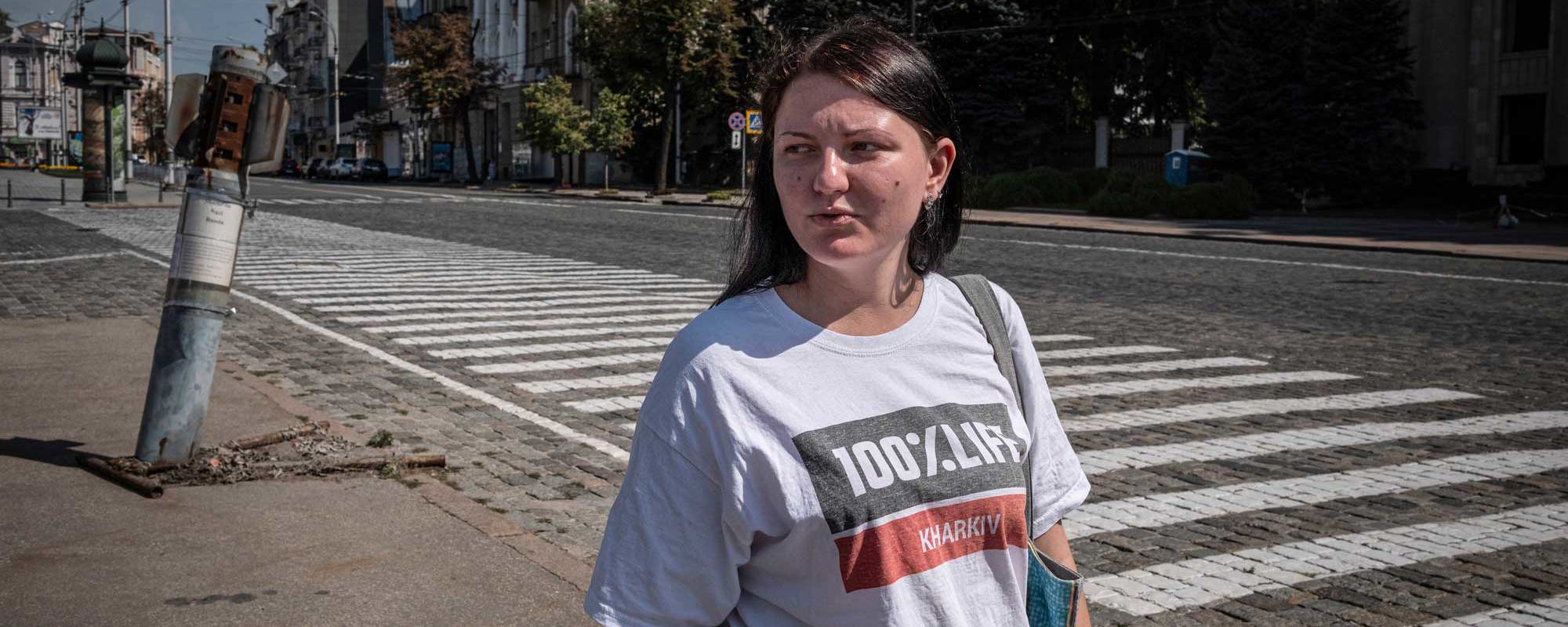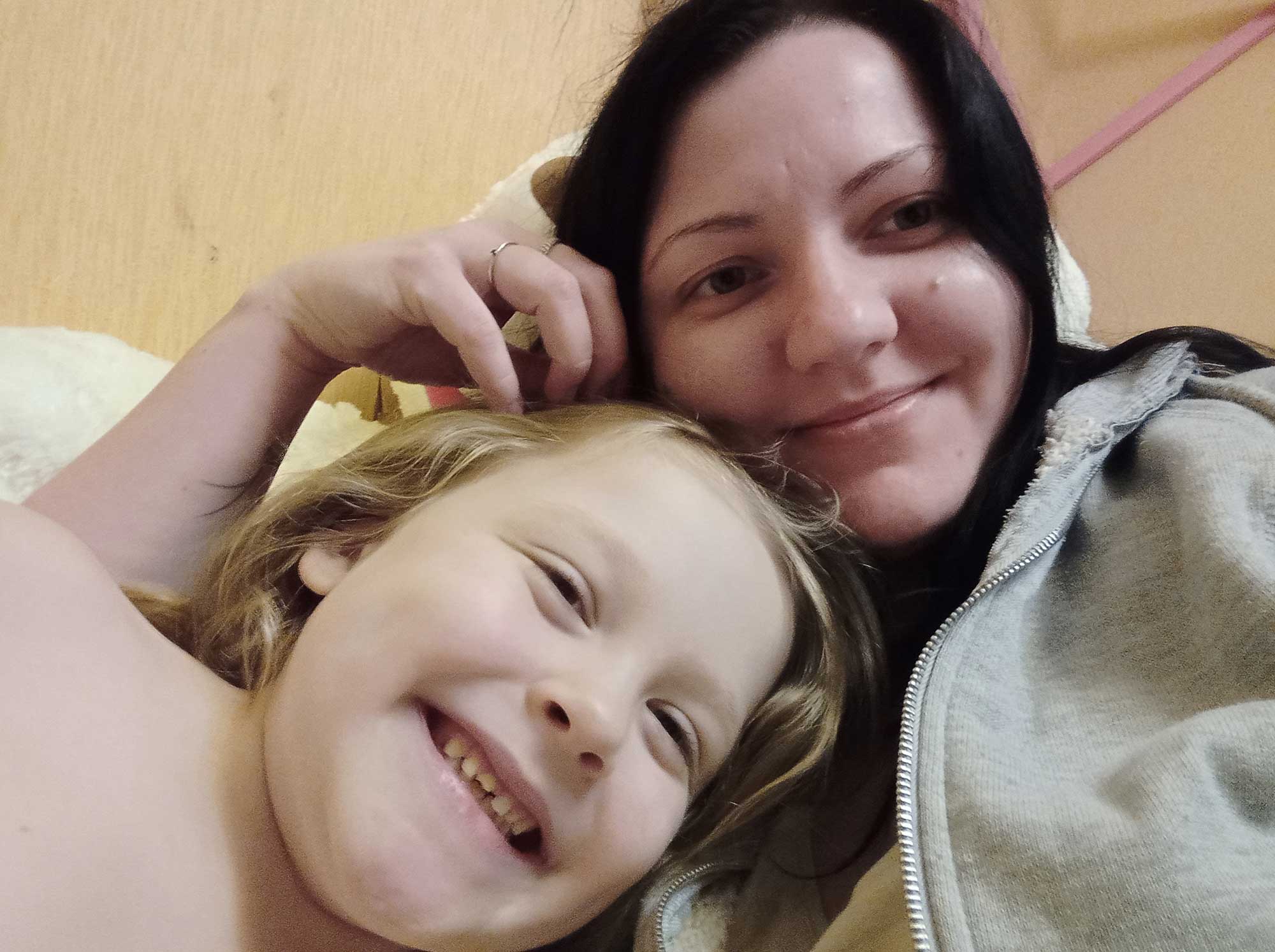

“But I Can’t Just Give Up.” In the Shadow of War, Yulia Continues to Support People with TB in Ukraine
Yulia is a tuberculosis (TB) outreach worker in Kharkiv, Ukraine. She works with 100% Life, the largest patient civil society organization in the country, which is also a Global Fund partner. In her role, she provides community-based health outreach services to prevent, diagnose and treat people with TB. Yulia is also the mother of 6-year-old Yaroslava.
Every day brings new challenges in Kharkiv.
Just a couple weeks ago, our city got hit with 10 missiles in a single night. We lost power, phone signal, internet, running water and heating.
The morning after, I walked for an hour to reach my office and collect the documents I needed to work from home. Then I walked around the city center trying to get phone signal so I could call my clients to find out if they were safe and if they had enough medications to ensure their TB treatment wouldn’t be interrupted.
It was a long and exhausting day – one of many since the war began more than a year ago. After that night, the power supply was restored around 48 hours later.
Having no electricity, heating and water has been difficult this past winter.
In Kharkiv, people feel emotionally drained and tired of living in constant stress and fear. But the generators, candles, flashlights and relatively warm weather have helped us survive.
People here are resilient and quickly adapt to their new reality. We have learned to keep a supply of water and canned food, to keep all our devices charged and to have a map of what we call “the points of invincibility” – heated and powered shelters. Because a new attack can happen at any moment.
People here are more concerned with their survival than with their health. It is getting harder to convince people to visit a doctor, even if they have very obvious signs of being sick.
There's also a lack of medical staff. Some doctors left at the beginning of the war, and while some have returned, many are understandably still gone. The medical personnel who are here work to the point of exhaustion.
We know that TB is spreading in Kharkiv. People are stressed because of the constant shelling. Some still live in poorly ventilated basements and many lack proper nutrition – all of these things lead to a higher risk of contracting TB.
But I can't just give up. I know that my clients need me.
I spend half my time in the hospital accompanying clients who come for TB testing or appointments, and I spend the other half in the streets talking to people who might be in a TB risk group.
I usually approach people lining up for food packages or meals and ask them if they have any symptoms, and if they do, I ask if they would be interested in getting tested. My organization, 100% Life, tries to make sure that all people with TB in Ukraine are diagnosed early and have ongoing access to treatment.
My clients include a 29-year-old man with TB that I see regularly. He lived in the subway during the first months of the war to protect himself from attacks and most likely got TB while living underground. He has epilepsy and seizures almost every day. He lives with his mother, and they are both very kind-hearted people.
I met this man and his mother back in the summer when they were waiting in line for food aid. He did not have symptoms back then, but his mother told me that they had spent a lot of time in the subway, so I left them my number and asked them to call if symptoms arose.
In January his mother called and said that her son was coughing, had a fever and was sweating. So I set up an appointment, accompanied them to the hospital where he tested positive for TB. I stay in touch with both of them now, checking to see if he's taking his medication and if they need any other support. We also helped them with food supplies, and once I arranged for a man to repair their fridge.
When I meet people like this, I'm grateful that I can help. This is one of the things that motivates me. But my biggest motivation is my daughter. I want a bright future and a better world for her.

Photo: Yulia Malyk
On days when I work, I take my daughter to stay with a nanny in the morning and I pick her up in the evening. Currently my daughter has almost no friends and does not go to school. So many kids have left Kharkiv that the kindergartens are closed.
As a mother, I have to continue working to support us financially, but I also need to take care of my daughter and ensure her safety. I am constantly thinking about where we can hide in case of sudden shelling.
The war in Ukraine is causing a health crisis and I know that a lot of efforts need to be made to sustain pre-war TB rates.
I often think about whether we should stay in Kharkiv or leave. We both love our city and my daughter cries when I mention leaving, but if the situation does not get better, we may need to search for a new home.
Since the beginning of the war in February 2022, 100% Life with the support of the Global Fund has reached more than 800 TB patients with vital support in Kharkiv. There are currently 94 employees and 20 volunteers working for 100% Life Network Kharkiv Region, including Yulia.
The Global Fund has invested more than US$25 million in emergency funding to support the continuity of HIV and TB prevention, testing and treatment services in Ukraine since February 2022. This is in addition to US$190 million in grants over the 2020-2022 period, including support to the country’s COVID-19 response.







